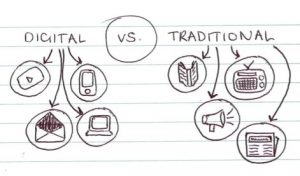What did we cover?
In this week’s lesson, our focus was on the impact of digital disruption. What exactly is digital disruption? Digital disruption is the introduction of new digital products, and more importantly how they can make an impact on your business model.
We also looked at the scope of digital marketing, with specific attention to the Internet of things, Big Data, and Marketing Automation.
Digital Disruption
Traditional marketing concepts are not to be thrown aside, and they’re still valuable! The shift over to digital presents new opportunities for a more direct, tailored, diverse and accountable marketing approach.
With the shift to digital, we now have more data than ever, and marketers need to make sure that they are utilising this power.
Below are some key opportunities and challenges that arise from digital disruption:
Opportunities-
- Enhanced customer knowledge
- Faster and more efficient channels
- Personal engagement
- Community-based marketing
- Two-way dialogue
- Niche segmentation
Challenges-
- Limitations with technology
- Customer brand power
- Training needs
- Cost of initial investment
- Too much data!
- Partial participation
The Scope of digital marketing
This is where we looked at how digital marketing is progressing and what new technologies are coming into play as we move forward.
Internet of Things:
The internet of things is the connection of remotely controlled, physical items to an online network. Through the IoT devices we have access to more accurate data that will help to market to people more successfully. Recently, there has been a significant rise in the number of connected devices over the years.
“The IoT promises to bring every object, consumer and activity into the digital realm”
Paul Daughty, Accenture CTO, Accenture
wearable devices such as the smart watch, is a great example of the type of device that can be used in marketing. Wearables like the smart watch are fitted with geo trackers, and location based vouchers are a way of utilising your customer data in a way that will benefit them.
Big Data:
The use of big data in marketing is accelerating and, at the moment, mostly being generated from users. However, future data will move to being collected by machines and connected devices (Internet of Things). Through data collection more opportunities are offered to better understand our customer’s needs.
90% if the data in the world today has been created in the past two years
Data is being generating constantly, but to make good use of the data it needs to be transmitted, stored, analysed, and acted upon. The two key areas for marketers to use is personal information, and business/ impersonal information.
Marketing Automation:
To put it simply, marketing automation is the automation of all your manual tasks; this could include sending emails, social media posting, and other various marketing activities. The automation of these activities saves time and allows you to focus more on the monitoring, measuring and improving of the customer experience once the campaign has been set up.
Marketing automation lets you integrate personalisation, 24-hour availability, and the ease of measurability with your campaigns; It’s widely being adapted by companies as a ‘must’!
Author
-
Emily joins the Napier Team as a digital marketing apprentice, with the support of Chichester College. Emily recently completed her A-levels in Fine Art, Photography and English Language.
View all posts

